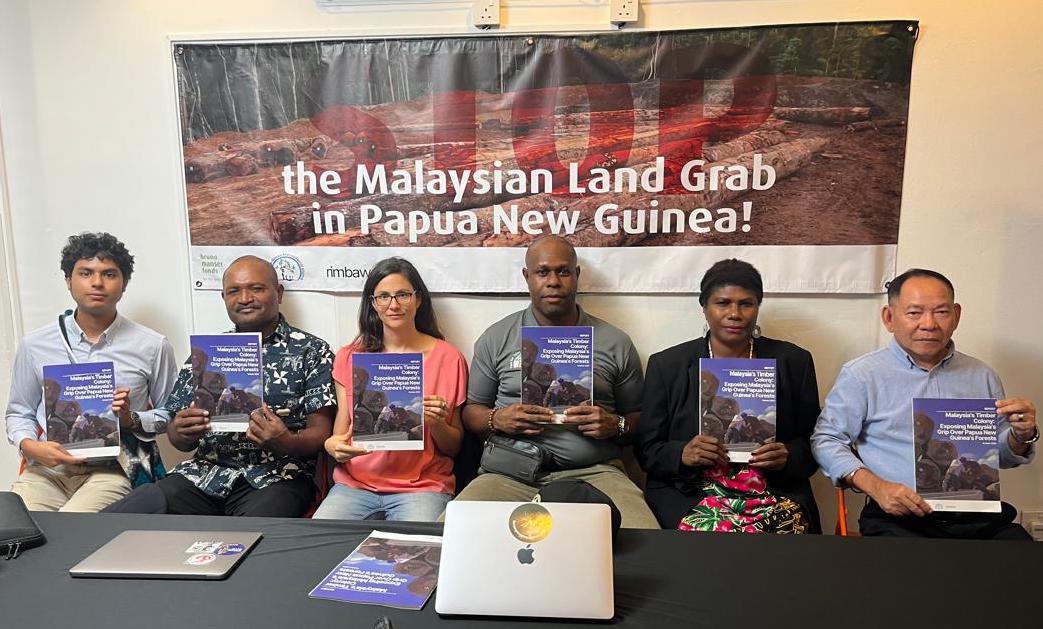
Malaysian timber tycoons should stop destroying Papua New Guinea (PNG)’s forests. 97% of controversial timber licences found to be linked to Malaysian business people, says Pamela Avusi, Coordinator for PNG Environmental Alliance.
(Kuala Lumpur, Malaysia). At a press conference today in Kuala Lumpur, representatives of Papua New Guinea’s civil society, along with partners RimbaWatch and the Bruno Manser Fonds, staged a protest against the actions of Malaysian logging firms in Papua New Guinea (PNG).
Papua New Guinea’s rainforests, part of the world’s third-largest tropical rainforest ecosystem, are increasingly at risk. The main threat is non-sustainable logging and forest-clearing. With an export volume of 2.5 million m3 in 2024, Papua New Guinea is the world’s largest exporter of tropical roundwood.
The protest follows the publication of a new report, “Malaysia's Timber Colony: Exposing Malaysia’s Grip Over Papua New Guinea’s Forests”, which investigates one of the main vehicles for deforestation in Papua New Guinea, Forest Clearing Authorities (FCAs), a licensing system for large-scale forest conversion. FCAs are issued by the government on the grounds of agricultural development. However they are often linked to the clear-cutting and subsequent conversion of highly-biodiverse forests, with the timber being exported to China and few economic benefits generated within the country itself.
The report finds that 97% (65 of 67) FCA licences are held by companies either registered in Malaysia, or in which Malaysian citizens are either the majority shareholders and/or directors.
1.68 million hectares of primary rainforest at risk
These Malaysian-linked companies hold licenses which threaten at least 1.68 million hectares of primary rainforest in Papua New Guinea, an area roughly equal to the state of Johor. Primarily, of the 79 Malaysians who are linked to these companies, the report finds that 44 individuals might be associated with the “big six” Sarawakian logging firms: Rimbunan Hijau, WTK, Samling, KTS, Shin Yang and Ta Ann. Together, these individuals alone control 60% of the FCA licenses.
Since the 1990s, there has been an influx of Malaysian companies in the timber industry in PNG. Forming part of the world’s third largest intact tropical forest, 15% of the country’s forest area has been degraded in recent years, and in 2013, PNG overtook Malaysia as the largest exporter of tropical timber in the world. While the involvement of Malaysian companies in the timber industry is well-known within PNG, this is the first time a report systematically documents the extent of Malaysia’s timber dynasties in the country.
Beyond the significant impacts FCA licenses have on biodiversity loss in PNG, such projects almost exclusively occur on Indigenous customary land, and FCAs have been found to involve serious human rights abuses, including land-grabbing, violations of the right to Free, Prior, Informed Consent (FPIC) and physical violence. In one case, a member of an Indigenous community was locked in a shipping container for one week.
Unsustainable logging by Malaysians in PNG must stop
“FCAs are an extremely unsustainable logging practice and is often associated with violations of indigenous peoples' rights. We call on the Malaysian timber tycoons behind 97% of these licenses to relinquish them. Papua New Guinea is destroying its forests and is fully aware of this. For this reason, the government has once again announced a moratorium on tropical timber exports at the end of this year. It is time to stop deforestation now. Please stop cutting down our forests.”, says Pamela Avusi, Coordinator of the PNG Environmental Alliance.
Along with their demands to the Government of PNG to fix the FCA licensing system, which includes a moratorium on all logging within FCAs until a review, the PNGEA and partners call on Malaysia to build the capacity of Malaysia’s National Action Plan on Business and Human Rights (NAPBHR), to govern the activities of Malaysia’s businesses abroad. This could include establishing a Human Rights Tribunal and a Supply Chain Act, which would include provisions to compel Malaysian companies to adhere to United Nations Declaration on the Rights of Indigenous Peoples (UNDRIP) in their overseas activities.
Link to the report https://actnowpng.org/publications/reports
Sign the petition to stop these FCA Abuses https://www.stopfca.org/en/
